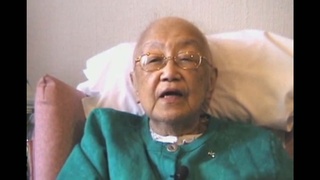Interviews
Company in Tokyo burned down (Japanese)
(Japanese) Even if I want to go home, I can’t so it’s useless. There’s no use thinking about it.
I*: During the war, if Pearl Harbor hadn’t been attacked, would you be in Japan now?
Yeah, of course. I was going to go back to Japan. I had started a company in Tokyo.
I: What happened to that company? What happened to that company? That company in Tokyo?
It burned down. Burned down. Even though I had built a company it burned up.
* "I" indicates an interviewer (Eriko Yamamoto).
Date: October 14 & 17, 2004
Location: California, US
Interviewer: Eriko Yamamoto
Contributed by: Watase Media Arts Center, Japanese American National Museum.









